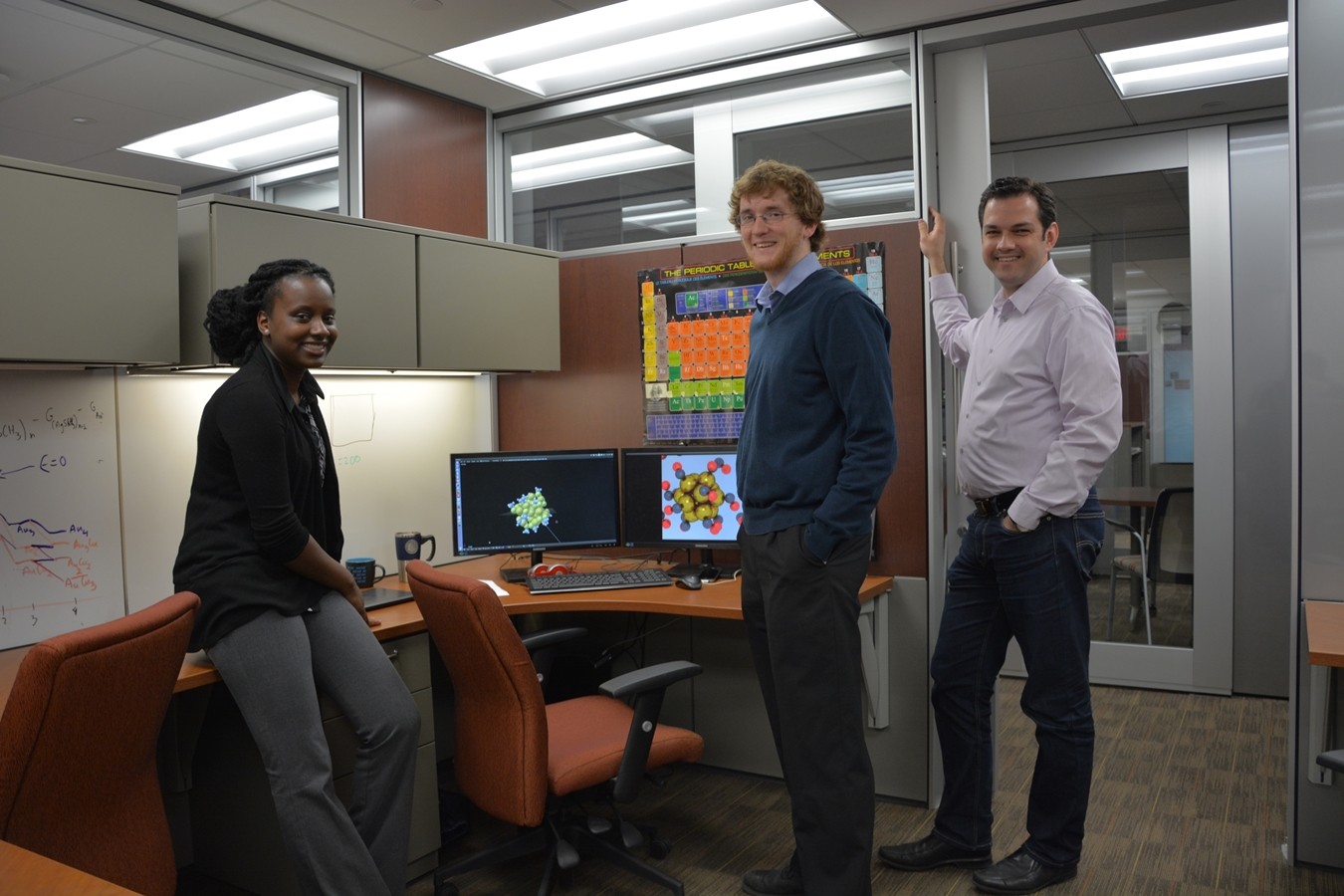Pitt graduate students in Chemical and Petroleum Engineering receive NSF Fellowship and Honorable Mention
Pictured from left: Natalie Austin, Michael Taylor, Giannis Mpourmpakis
PITTSBURGH (April 30, 2015) … Two students in the Chemical and Petroleum Engineering graduate program at the University of Pittsburgh's Swanson School of Engineering were recognized by the 2015 National Science Foundation (NSF) Graduate Research Fellowship Program (GRFP).
PhD candidate Natalie Austin, a native of Edgewood, Md. who earned a bachelor of science in chemical engineering/bioengineering from the University of Maryland, Baltimore County (UMBC), received an NSF Fellowship; and graduate student Michael G. Taylor, a native of Omaha, Neb. who earned a bachelor of science in chemical and biomolecular engineering from the University of Nebraska-Lincoln, received an honorable mention. Both are part of the Computer-Aided Nano and Energy Lab (C.A.N.E.LA.) led by Principal Investigator and Assistant Professor Giannis Mpourmpakis, PhD .
"This is a great accomplishment for Natalie and Michael, and I am very proud that they were selected from a highly competitive cohort," Dr. Mpourmpakis said.
The NSF Graduate Research Fellowship Program recognizes and supports outstanding graduate students in NSF-supported science, technology, engineering, and mathematics disciplines who are pursuing research-based Master's and doctoral degrees at accredited United States institutions. This year NSF awarded the GRF to 2,000 individuals from among 16,500 applicants.
According to the NSF, this year's awardees represent a diverse group of scientific disciplines and come from all states, as well as the District of Columbia, and commonwealths and territories of the United States. They are also a diverse group of individuals. Among the 2,000 awardees, 1,053 are women, 494 are from underrepresented minority groups, 43 are persons with disabilities, and 31 are veterans.
The 2015 class of Graduate Fellows comes from 456 baccalaureate institutions, 72 more than in 2010, when GRFP began awarding 2,000 fellowships each year.
Since 1952, NSF has provided fellowships to individuals selected early in their graduate careers based on their demonstrated potential for significant achievements in science and engineering. The NSF Graduate Research Fellowship Program (GRFP) is a critical program in NSF's overall strategy to develop the globally-engaged workforce necessary to ensure the nation's leadership in advancing science and engineering research and innovation.
A high priority for NSF and GRFP is increasing the diversity of the science and engineering workforce, including geographic distribution and the participation of women, underrepresented minorities, persons with disabilities, and veterans. With its emphasis on support of individuals, GRFP offers fellowship awards directly to graduate students selected through a national competition. The GRFP provides three years of financial support within a five-year fellowship period ($34,000 annual stipend and $12,000 cost-of-education allowance to the graduate institution) for graduate study that leads to a research-based master's or doctoral degree in science or engineering.
Fellows may also be eligible for access to cyberinfrastructure resources through the NSF supported Extreme Science and Engineering Discovery Environment (XSEDE) and for Facilitation Awards for Scientists and Engineers with Disabilities (FASED).
About the Department of Chemical and Petroleum Engineering
The Department of Chemical and Petroleum Engineering serves undergraduate and graduate engineering students, the University and our industry, through education, research, and participation in professional organizations and regional/national initiatives. Our commitment to the future of the chemical process industry drives the development of educational and research programs. The Department has a tradition of excellence in education and research, evidenced by recent national awards including numerous NSF CAREER Awards, a Beckman Young Investigator Award, an NIH Director's New Innovator Award, and the DOE Hydrogen Program R&D Award, among others. Active areas of research in the Department include Biological and Biomedical Systems; Energy and Sustainability; and Materials Modeling and Design. The faculty has a record of success in obtaining research funding such that the Department ranks within the top 25 U.S. ChE departments for Federal R&D spending in recent years with annual research expenditures exceeding $7 million. The vibrant research culture within the Department includes active collaboration with the adjacent University of Pittsburgh Medical Center, the Center for Simulation and Modeling, the McGowan Institute for Regenerative Medicine, the Mascaro Center for Sustainable Innovation, the Petersen Institute of NanoScience and Engineering and the U.S. DOE-affiliated Institute for Advanced Energy Solutions.
###
Contact: Paul Kovach

